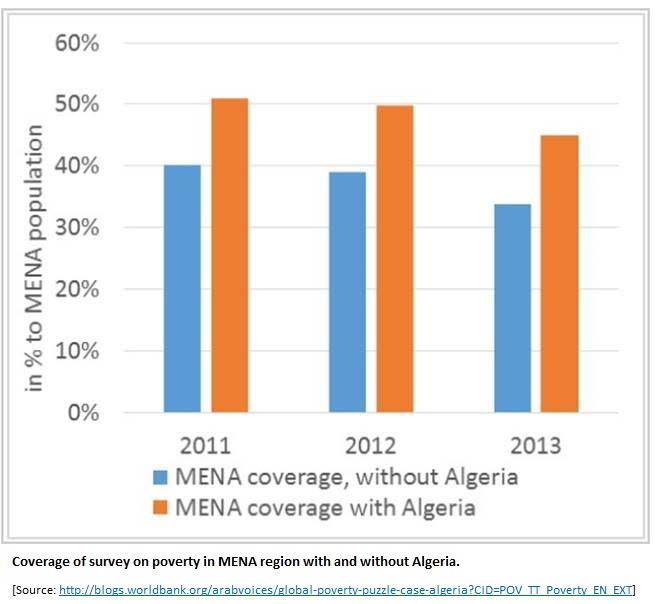Newly released data from Algeria may help connect climate and poverty in the MENA region

It’s not news that climate change disproportionately affects the poor. The prediction that globally millions would be living in extreme poverty by 2030 as a result of climate change, has been made in a variety of reports over the years by international agencies such as the Food and Agriculture Organization (FAO) and the World Bank Group (WBG). However, in the Middle East and North Africa (MENA) region, reliable data on poverty trends has been limited by low survey availability. Because of low coverage, the World Bank Group which systematically compiles and compares poverty data, in recent years could not release a regional estimate for the MENA region as it did for every other region in the world. For example, in 2013, the amount of data available would have only covered 34% of the MENA region’s population, judged to make its release more misleading than informative.
New data released by Algeria represents an important step on the road to better statistics on poverty in the MENA region. Algeria has recently collaborated with the team of the WBG Poverty and Equity Global Practice to make MENA region’s data more broadly available. By incorporating Algeria, a country with around 38.1 million inhabitants in 2013, the database can substantially increase its coverage for the MENA region, pass the minimum thresholds for reporting, and is expected to help update the regional estimates of the corresponding periods. Preliminary analyses of the newly available data indicate that inequality in Algeria is lower than in the rest of the region, and that extreme poverty rates were higher in urban areas than in rural areas, which is a relatively uncommon result.
Reliable poverty estimates and economic growth projections are crucial for targeting public spending and achieving maximum impact. According to the regional Outlook of the Global Economic Prospects 2017, economic growth in the MENA region is projected to fall to 2.1 % in 2017 and forecast to pick up gradually to 2.9 % in 2018, reaching 3.1 % by 2019, assuming a moderation of geopolitical tensions and an increase in oil prices. In the short term, Algeria’s economy is expected to slow to 1.8 percent amid fiscal consolidation and weaker hydrocarbon sector growth. Egypt’s growth is expected to remain near 4% in fiscal year 2017 and strengthen in the two years thereafter, supported by the gradual implementation of business reforms and improved competitiveness. Morocco is forecast to pick up to a 3.8 percent growth pace in 2017 and 3.7% rate next year as agricultural production rebounds due to an improvement in weather conditions and as reforms are implemented. Growth in Tunisia is forecast to accelerate to 2.3% in 2017 and 3% in 2018 for similar reasons. A gradual recovery in growth is also expected in Jordan as reforms progress, and in Lebanon as political stability is restored.
Resources: Global Economic Prospects 2017 | Regional Initiative on Water Scarcity for the Near East and North Africa | FAO Regional Overview of Food Insecurity



